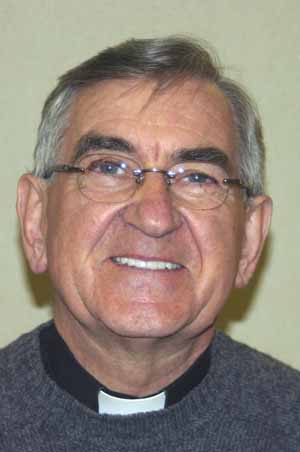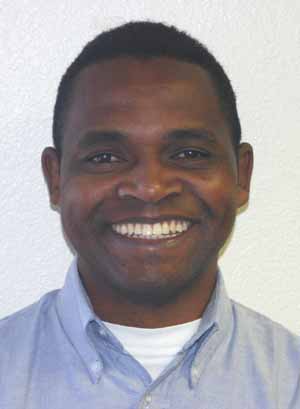By Celine Klosterman

Catholic Relief Services works to help people around the world lift themselves out of poverty, two representatives of the U.S. Catholic community’s humanitarian agency noted during visits to the Davenport Diocese.
Felicien Randriamanantenasoa, head of programming with CRS-Madagascar, and Msgr. Padraic Loftus, a CRS global fellow, discussed CRS’ work as the agency’s Operation Rice Bowl campaign continues during Lent.
Speaking at St. Mathias Church in Muscatine the weekend of March 3-4, Msgr. Loftus displayed the small cardboard boxes that Catholics fill with coins and bills as part of Operation Rice Bowl. Seventy-five percent of funds collected go to CRS to help with overseas development projects, and 25 percent remains in the diocese to support local efforts to fight hunger and poverty. Along with the boxes, the agency provides reflections and information about projects benefiting people worldwide.
“During this Lenten season, I encourage you to open your hearts to the poor,” Msgr. Loftus said.
He discussed CRS’ efforts in Haiti following the country’s 2010 earthquake, the agency’s response to the 2004 tsunami in Sri Lanka and the organization’s work to feed children in east Africa. He also touched on CRS’ Fair Trade program, which aims to promote healthy and safe working conditions, support environmentally sustainable practices and provide fair wages to people who produce food and goods.
He encouraged Catholics to pray for CRS staffers. “We see Jesus in people who are suffering,” Msgr. Loftus said, citing Matthew 25:40: “Whatever you did for one of these least brothers of mine, you did for me.”

CRS is embracing that message in Madagascar, where 75 percent of the country’s 22 million people live on less than $2 a day, Randriamanantenasoa said at the Humility of Mary Center in Davenport on Feb. 25. He also visited Mount Pleasant, Grinnell and Long Grove.
Eighty percent of the African nation’s residents live in rural areas, but farmers rely on rudimentary agricultural techniques that can’t produce enough food for families or for the country, he said. The agency is working to help people increase production of rice, diversify their crops, make small investments through savings and lending communities, improve management of natural resources, determine and implement good models of governance, and set up infrastructure such as roads and irrigation canals.
CRS also works to promote hygienic practices, provide clean water and improve sanitation in Madagascar, where the population suffers from high rates of malaria, respiratory infections and other illnesses, Randriamanantenasoa said.
He thanked U.S. supporters for their advocacy and donations. “If not for them, Madagascar would be worse off,” he said.
CRS works closely with a country’s residents, who run projects themselves, said Glenn Leach, a volunteer in the diocese’s social action department. “It’s a hand up, not a handout.”
“We always need to be aware of the needs of others,” said Sister Bea Snyder, CHM, after Randriamanantenasoa’s presentation. “The Quad City community is one of the most generous I’ve experienced. With all the blessings we have, we need to share.”
For more information, visit www.crs.org.








